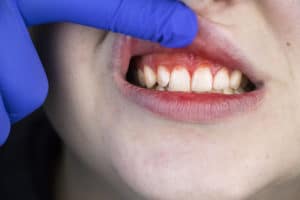555 Kinderkamack Road, Suite 100, Oradell, NJ 07649
While tooth decay may be one of the most commonly discussed issues in dental offices, gum health is equally important and should not be overlooked. Healthy gums can prevent tooth decay; conversely, poor gum health can result in tooth loss. At Oradell Family Dental, we are concerned with maintaining the health of your entire mouth, which is we offer periodontal care. This includes preventing decay and disease in structures that support both your teeth and your gums, and, when needed, performing gum disease treatments in Oradell.
 While damage caused by bacteria is directly responsible for gum disease, neglecting the health of your gums is the real cause of most gum disorders. Many individuals do not recognize the important role that their gums play in their oral health. But in reality, your gums are responsible for protecting the roots of your teeth and the jaw bones that hold them in place.
While damage caused by bacteria is directly responsible for gum disease, neglecting the health of your gums is the real cause of most gum disorders. Many individuals do not recognize the important role that their gums play in their oral health. But in reality, your gums are responsible for protecting the roots of your teeth and the jaw bones that hold them in place.
When you neglect your gums, they become susceptible to gum disease, which breaks down the gum tissue and exposes the roots of your teeth. In advanced cases, gum disease can even expose your jaw bone. Unfortunately, many individuals with gum disease never realize the problem exists.
Preventing gum disease is as simple as following good dental hygiene and being diligent about noticing changes to the coloration and texture of your gums. Flossing plays a key role in protecting your gums from the buildup of bacteria that thrives on the debris that gets stuck between your teeth when you eat. Flossing or rinsing your mouth with water after you eat can significantly reduce the risk of gum disease.
Antibacterial mouthwash can also play a part in protecting your gums from decay. However, even the most thorough flossing and brushing cannot completely remove the plaque and tartar that is caused by the buildup of bacteria on your teeth. Regular dental cleanings are necessary to ensure proper oral health.
 You should visit Oradell Family Dental immediately if you notice that your gums:
You should visit Oradell Family Dental immediately if you notice that your gums:
These are all symptoms of gum disease and may indicate that your gums are at risk. If gum disease is diagnosed in its early stages, it can be effectively treated and may cause no permanent damage. However, gum disease that is allowed to languish and worsen can threaten the health of your entire mouth. Oradell periodontal dentist Dr. Howard Perlmutter may recommend one or more of the following gum disease treatments:
” I was in for a cleaning and, as always, I was impressed by the professionalism of the staff. My hygenist is great, answers questions I may have and does a very thorough cleaning job. “
Click here to read more reviews.
For more information on the health of your gums, please see our Periodontics page.
If you have some of the symptoms of gum disease, please contact our periodontal dentist today to schedule an appointment at Oradell Family Dental. Dr. Perlmutter serves patients in Northern New Jersey, including Dumont, Bergenfield, Paramus, Oradell, Haworth and Bergen County areas.
Oradell Family Dental
 N/a
N/a